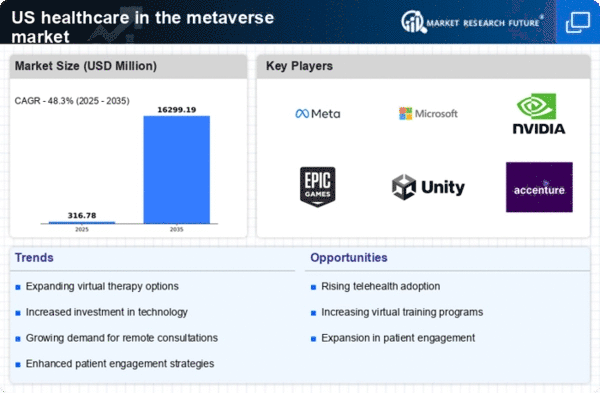Rising Focus on Mental Health Awareness
The heightened awareness surrounding mental health issues is a critical driver for the healthcare in-metaverse market. As society increasingly recognizes the importance of mental well-being, there is a growing need for accessible mental health services. The metaverse offers innovative platforms for therapy and support groups, allowing individuals to engage in a safe and anonymous environment. Reports indicate that the mental health app market is expected to reach $4 billion by 2025, reflecting the potential for growth in this sector. This focus on mental health is likely to propel the healthcare in-metaverse market as providers seek to meet the evolving needs of patients.
Regulatory Support for Telehealth Expansion
Regulatory support for telehealth services is emerging as a vital driver for the healthcare in-metaverse market. Recent policy changes have expanded the scope of telehealth, allowing for broader access to virtual care. This shift is particularly beneficial for underserved populations, who can now receive medical attention without geographical barriers. The Centers for Medicare & Medicaid Services (CMS) has reported a significant increase in telehealth utilization, with over 50% of beneficiaries using these services in recent months. Such regulatory advancements are likely to enhance the adoption of metaverse solutions, thereby propelling the healthcare in-metaverse market.
Technological Advancements in Virtual Reality
The healthcare in-metaverse market is experiencing a surge due to rapid advancements in virtual reality (VR) technologies. These innovations enable immersive simulations for medical training, patient rehabilitation, and therapeutic interventions. For instance, VR applications can create realistic environments for surgical practice, enhancing the skills of healthcare professionals. The market for VR in healthcare is projected to reach approximately $3.8 billion by 2026, indicating a robust growth trajectory. This technological evolution not only improves training outcomes but also enhances patient engagement and satisfaction, thereby driving the healthcare in-metaverse market forward.
Increased Investment in Digital Health Technologies
Investment in digital health technologies is significantly shaping the healthcare in-metaverse market. Venture capital funding for health tech startups has surged, with investments exceeding $14 billion in 2021 alone. This influx of capital is facilitating the development of innovative solutions within the metaverse, such as virtual clinics and health monitoring systems. As healthcare organizations recognize the potential of these technologies to improve efficiency and patient outcomes, the demand for metaverse applications is expected to rise. This trend suggests a promising future for the healthcare in-metaverse market as it continues to attract substantial financial backing.
Growing Demand for Personalized Healthcare Solutions
There is an increasing demand for personalized healthcare solutions, which is significantly influencing the healthcare in-metaverse market. Patients are seeking tailored treatment plans that cater to their unique health needs. The integration of AI and data analytics within the metaverse allows for the customization of healthcare experiences, from virtual consultations to personalized wellness programs. This trend is expected to contribute to a market growth rate of around 25% annually, as healthcare providers leverage these technologies to enhance patient care and outcomes. Consequently, the healthcare in-metaverse market is poised for substantial expansion.

























Leave a Comment